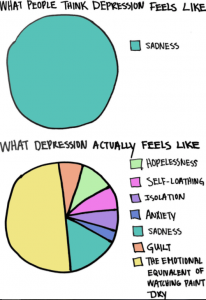Apathy and Acceptance – The Start of a Journey
Hello and welcome, or welcome back as it may happen.
Today is lovely, especially for Florida. It’s in the mid-60’s, there’s a light breeze, the sky is light and blue. Some of the trees are starting to get some color on them and it’s cool enough that I’ve put a sweater on the dog since she’s so cold natured.
Yet, despite the comfort and beauty, I am depressed.
It hardly seems believable; it’s a gorgeous day, excepting a cold, I’m healthy, I have family, friends. How could I be sad?
It’s not a sadness per se. Not really. I feel thankful for the blessings I’ve listed above and more, but at the same time, I don’t care. That apathy, it’s miserable.
So, what is apathy?
Apathy comes from two Greek words. A-, meaning without, and -pathy, which comes from the Greek word pathos, meaning feeling. So, apathy means ‘without feeling’.
Have you ever felt a pervading nothingness? Your usually delicious latte tastes like nothing. That candle you loved the scent of so much is wasted on you. You feel like somebody could tell you that you’ve won $1,000 and you’d just say, ‘eh.’
A lot of that, no, all of that is part of depression.
Many people with depression will tell you that it isn’t all sadness, but a lot of it is feeling empty.
“The emotional equivalent to watching paint dry.” Read: apathy.
It’s important to know that apathy does not equal depression. A depressed person is not always apathetic, and an apathetic person is not always depressed.
Remember, elephants are gray, but not all gray things are elephants.
Depression does cause a lot of similar symptoms to apathy, such as a lack of motivation and lack of pleasure. The lack of pleasure that I feel in this gorgeous afternoon is a product of my depression. The fact that I managed to find the motivation to clean out the car, make my bed, and sweep the porch means that I’ve punched through some of my lack of motivation to get some things done.
Did I want to?
No. And yes.
Knowing When Sadness and Apathy Have Turned to Depression
Stagnating, lying in bed all day, vegetating on the couch flipping aimlessly through YouTube or blindly hitting Continue Watching for the fifth time of the day, that is what is so detrimental to the health of the mentally ill. An occasional day of vegetation is fine, but when that day becomes a week and that week threatens to continue, know that you need help.
Ladies, gentlemen, there is no shame whatsoever in admitting that you need help. You can make all the excuses you want to. “It’s not that serious.” Or “Just leave me alone, let me do it in my own time.” Or worse, “I’m fine. Nothing wrong with me. I don’t need help,” is denial.
Accepting that you have depression or any mental illness is a lot like the stages of grief.
Denial: Oh, I don’t have depression, it’s just an off day.
Anger: Leave me alone! I’m fine! I don’t have a mental illness! I’m not crazy!
Bargaining: Fine, I’ll go to the doctor, will you stop bugging me about it then? Yes, I’ll do whatever they say, but I’m telling you, I’m fine.
Depression: It’s hard realizing you really do have a mental illness and it’s heartbreaking because whether you’ve actively thought about it or not, you know that the stigma still exists.
Acceptance: I have a mental illness, it’s part of who I am, but I am more than my illness.
Finding your way to acceptance is a journey as much as finding your way to recovery, and it’s the first step.
Please, do not be ashamed. There are so many of us out here.
If you are in crisis, or if somebody you love is in crisis, call the National Suicide Prevention Hotline at 1-800-273-8255. They are there to help. I have called these people. They will not judge, they will listen. They will let you cry. If you ask for it, they will call you help. They are there for you.
